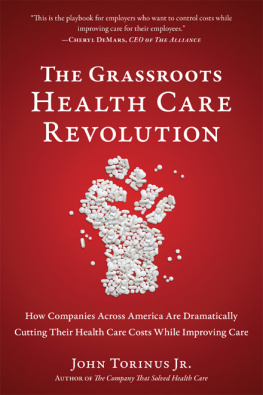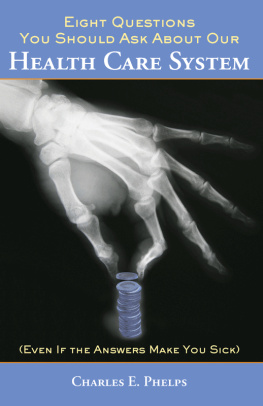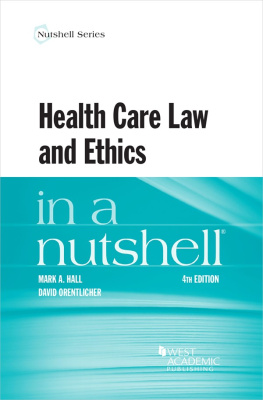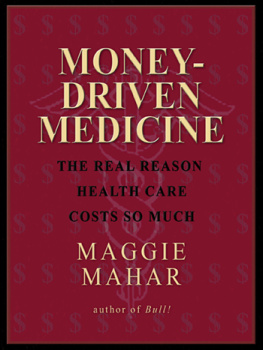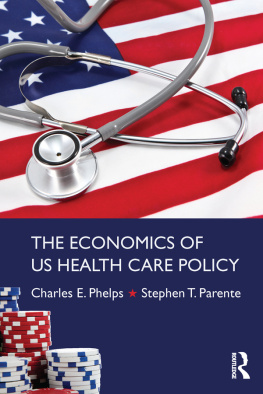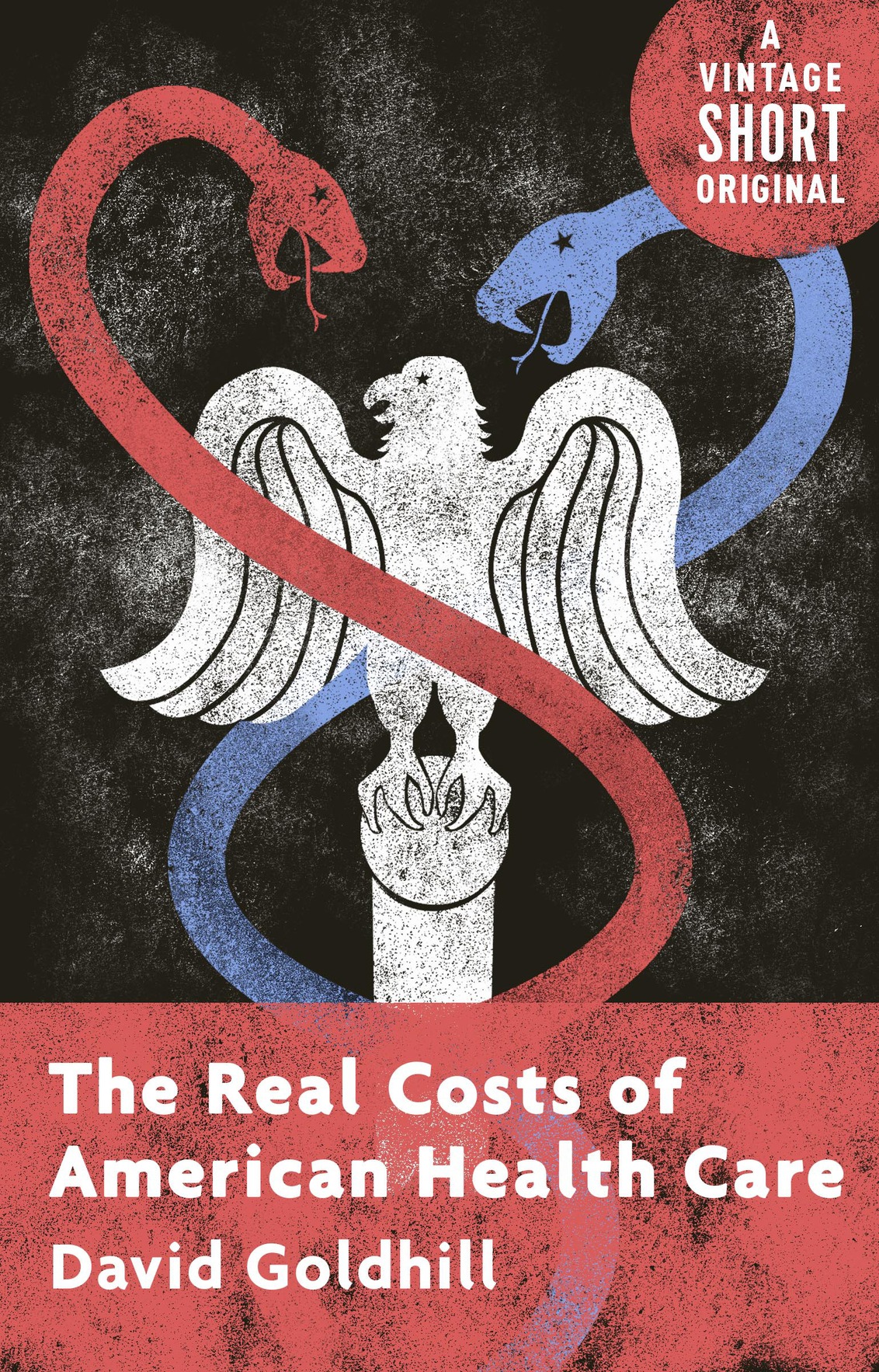The Real Costs of American Health Care
David Goldhill
A Vintage Short
Vintage Books
A Division of Penguin Random House LLC
New York
Copyright 2016 by David Goldhill
All rights reserved. Published in the United States by Vintage Books, a division of Penguin Random House LLC, New York, and distributed in Canada by Random House of Canada, a division of Penguin Random House Canada Limited, Toronto.
Vintage and colophon are registered trademarks of Penguin Random House LLC.
The Cataloging-in-Publication Data for The Real Costs of American Health Care is available from the Library of Congress.
Vintage Books eShort ISBN9780525433149
Series cover design by Joan Wong
www.vintagebooks.com
v4.1
ep
Contents
Three years ago, my good friend Alessandros eighty-three-year old father was diagnosed with a failing aortic valve. So like roughly eighty thousand American seniors each year, his dad underwent a heart valve replacement operation. Thanks to the now everyday miracle of modern medicine, my friends father left the hospital ten days later. Thirty days after the surgery, he was still alive, making the operation successful by Medicares sole post-op standard. But barely four months afterward, his dad woke up in the middle of the night with massive internal hemorrhaging. He was unconscious when he was brought to a hospital that night for emergency brain surgery and died without regaining consciousness four weeks later.
Alessandros dad died as a direct result of the care he received. Patients recovering from valve replacements are placed on anticoagulant drugs. Alessandros dad probably bumped his head on something so mildly that he didnt tell his wife. However, a minor injury can mean fatal internal bleeding for an elderly patient taking an anticoagulant. Alessandros family was unaware of this risk. None of the heart surgeons they interviewed had mentioned it or, for that matter, any other risks.
Sadly, this particular cause of deathwhile uniquely tragic to Alessandro and his familyis extremely common. A study of all Medicare patients who died in 2008 found that doctors had performed surgery on fully a third of patients in the last year of their lives. Aggressive surgical treatment is so common that even one in five ninety-year-olds had surgery before dying!
Even if Alessandro and his family had been fully informed of all the risks of heart valve replacement, its likely his dad still would have had the operation. When it comes to health care, most of uspatients and doctorsdisplay whats called treatment bias. Thats our preference to do somethinganythingto address a medical issue. Even when patients are told that the survival rate is as good by doing nothingas many men with early-stage prostate cancer are adviseda majority still opt for treatment, with all its painful and risky side effects.
Treatment bias led Alessandros dad to choose aggressive surgery that wound up accelerating his death over other options that would likely have produced a more gradual decline. It is treatment bias that explains why the physicians he consulted recommended only surgery and downplayed the associated risks and complications.
Treatment bias is commonly cited as a reason why there can never be a normal market for health care. Were just too desperate, too vulnerable to be real consumers, as we are of other products. Paradoxically, our very efforts to protect people from their vulnerability as patients has turned treatment bias from a personal consideration into a national plague.
During the past fifty yearsfrom the passage of Medicare and Medicaid to the implementation of the Affordable Care Act (ACA)our country has continually expanded efforts to help Americans pay for health care. At the same time, the share of our economy devoted to health care has risen from 6 percent to 18 percent. This is not a coincidence. Collectively, our health-care policies sum to a national treatment bias, favoring the consumption of health care over any other private or public good.
Our collective treatment bias will force any young person starting out today to put well over $1 million into our health-care system during her lifetime, regardless of her own health-care needs. At the current levels, a young persons contributions to our health-care system are likely to exceed the funds she has available for housing or raising children. It is societys treatment bias that explains why seniors pay more of their income out of pocket for health care today than they did before Medicare, even though Medicare pays for almost all their care! Its treatment bias that explains why almost all the additional aid to poor people in the past twenty years has gone to pay for only health care.
But the extravagant cost is only part of the problem.
Americas treatment bias has allowed the development of a health-care industry so bloated, so undisciplined, so inefficient that it is now a clear threat to our actual health, even with all the good it actually does. A recent Johns Hopkins study concluded that deaths from medical mistakes are now the third leading cause of death in America at an incomprehensible 250,000 per year. The number of serious, but nonfatal, injuries has been separately estimated to be in the millions. Even industry apologists accept that a quarter to a third of U.S. health-care spending is unnecessary, excessive, or inappropriate. Thats not just hundreds of billions of monetary waste; thats millions of patients bearing the side effects, complications, or risks from unnecessary care.
Obviously, good health care is one of lifes necessities. But just as food is a necessity capable of being overeaten and badly balanced, our health-care system has turned a necessity into an illness. How did America become so health-care obese?
The Conventional Wisdom
Theres a story weve been telling ourselves about health care for at least three generations. Our need for care is mostly urgent, unpredictable, and major. Driven by technology, highly trained professionals, and ever more complex treatments, the cost of care must be high and can only rise. As people live longer, the need for care will grow. All this creates extraordinary vulnerability for much of our populationfew could afford the enormous cost of essential treatments for major illnesses.
Theres also broad agreement that health care is so different from anything else that patients can never perform a normal role as consumers. Were too desperate and emotional to shop around effectively. Health care is too complicated for us to buy wisely. Prices are not transparent, and the scope of needed services is often unclear until treatment begins. As a result, the usual role of customer is best performed by a dispassionate institution large enough to drive down high prices and discipline excess demand for care.
This is the conventional wisdom of health care, and its broad acceptance is why all developed countries have extensive health-care policies that replace the usual market dynamics with extensive financial support for patients and large intermediaries purchasing care on their behalf.


